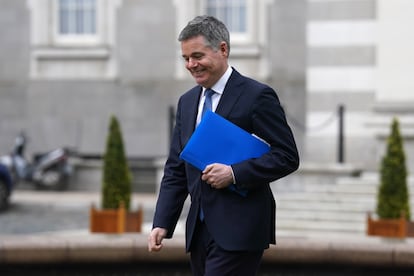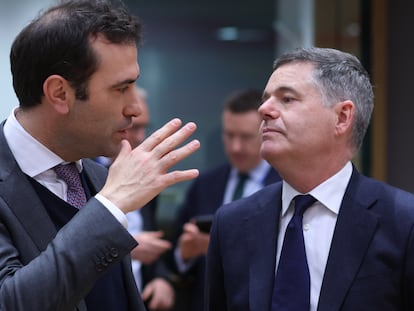The paralysis of the Eurogroup

Strictly opinion pieces that reflect the author's own style. These opinion pieces must be based on verified data and be respectful of individuals, even if their actions are criticized. All opinion columns by individuals outside the EL PAÍS editorial team will include, after the last line, a byline—no matter how well-known—indicating the author's position, title, political affiliation (if applicable), or main occupation, or any that is or was related to the topic addressed.

The entire G-7 is on its knees. On June 28, it applauds Washington's withdrawal from the OECD agreement that imposed a minimum 15% corporate tax on multinationals . Germany, France, and Italy, obligated to pay this tax by a European directive, are tarnishing their companies with new unfair competition from the US. Neither the Commission nor the Eurogroup complains.
German Chancellor Friedrich Merz kills the banking union. "There is absolutely no reason" to consolidate the deposit guarantee funds (DGFs) currently "at the Member State level," he declared on July 3, for fear of being burdened with the failures of other member banks, or risk sharing . The common DGF is the weak link in the banking union. Postponing it goes against the commitments of the five presidents in 2014 and 2015 and the Commission's 2014 draft directive.
And it jars with the non-paper issued by the five major partners to the Eurogroup, including Germany, to "progress on specific banking union projects." Neither the Commission nor the Eurogroup bat an eye. This is a stark contrast to the blind, irresponsible (financially) and incompetent activism of Brussels (it lacks the necessary powers) regarding a popular banking takeover in Spain.
The Commission, at least, is doing things. Less wonderful every day: supporting the racist and illegal actions of Italy and Denmark by deporting immigrants, encouraging excessive military spending in favor of American industry. But the Eurogroup has not emerged from its paralysis since 2020, when Portuguese Mário Centeno handed over his leadership to Irishman Paschal Donohoe, with the Next Generation funds already channeled against the pandemic crisis, financed through eurobonds—the ecstasy.
Nothing emerges from that presidency. Never mind the Russian invasion of Ukraine in 2022; the suffocation of inflation; the collapse of multilateralism due to Trump's tariffs; the eurozone's loss of competitiveness as the euro appreciated by more than 14% a week before his inauguration; or the reopening of the debate on the euro's possible role as a reserve currency, launched by the ECB. At best, everything is resolved through asthmatic, routine statements devoid of any underlying purpose (EL PAÍS, 6/18/2025).
Meanwhile, the flagship eco-financial projects of the 2014/2015 biennium, the culmination of the Banking Union and the Capital Markets Union (CMU), are slumbering. There are two exceptions, neither thanks to the leadership of the decrepit institution. Namely, a generic, vague roadmap proposed by France and Germany and approved in March 2024. And the common " Finance Europe " label, for voluntary comparable assets to finance SMEs, launched by Spain and France and adopted by the European Competitiveness Lab of the six major countries (plus Luxembourg), with the collaboration of the Commission. A kind of imaginative "enhanced cooperation" of volunteers in small steps.
All this awaits the launch of a larger initiative inspired by the Letta report (which proposes reinvesting in Europe the 330 billion euros in European savings diverted annually to the US) and the Draghi report, which proposes 800 billion euros in additional annual investments to regain momentum.
Do you want to add another user to your subscription?
If you continue reading on this device, it will not be possible to read it on the other device.
ArrowIf you want to share your account, upgrade to Premium, so you can add another user. Each user will log in with their own email address, allowing you to personalize your experience with EL PAÍS.
Do you have a business subscription? Click here to purchase more accounts.
If you don't know who's using your account, we recommend changing your password here.
If you decide to continue sharing your account, this message will be displayed indefinitely on your device and the device of the other person using your account, affecting your reading experience. You can view the terms and conditions of the digital subscription here.


EL PAÍS





